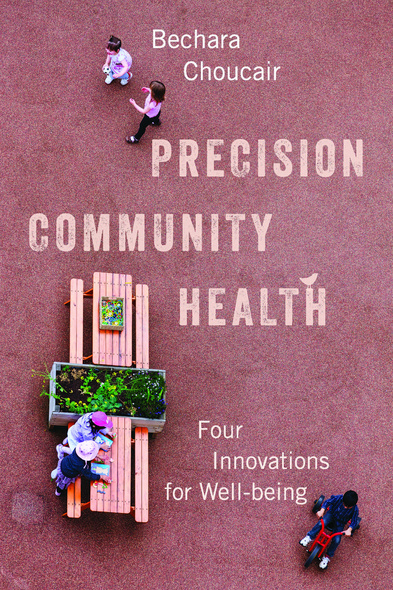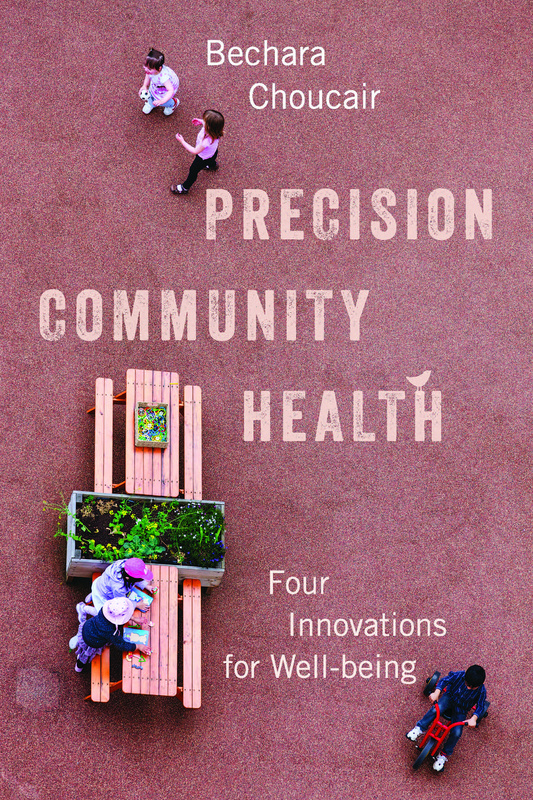When Bechara Choucair was a young doctor, he learned an important lesson: treating a patient for hypothermia does little good if she has to spend the next night out in the freezing cold. As health commissioner of Chicago, he was determined to address the societal causes of disease and focus the city’s resources on its most vulnerable populations. That targeted approach has led to dramatic successes, such as lowering rates of smoking, teen pregnancy, breast cancer mortalities, and other serious ills.
In Precision Community Health, Choucair shows how those successes can be replicated and expanded around the country. The key is to use advanced technologies to identify which populations are most at risk for specific health threats and avert crises before they begin. Big data makes precision community health possible. But in our increasingly complex world, we also need new strategies for developing effective coalitions, media campaigns, and policies. This book showcases four innovations that move public health departments away from simply dispensing medical care and toward supporting communities to achieve true well-being.
The approach Choucair pioneered in Chicago requires broadening our thinking about what constitutes public health. It is not simply about access to a doctor, but access to decent housing, jobs, parks, food, and social support. It also means acknowledging that a one-size-fits-all strategy may exacerbate inequities. By focusing on those most in need, we create an agenda that is simultaneously more impactful and more achievable. The result is a wholesale change in the way public health is practiced and in the well-being of all our communities.
In Precision Community Health, Choucair shows how those successes can be replicated and expanded around the country. The key is to use advanced technologies to identify which populations are most at risk for specific health threats and avert crises before they begin. Big data makes precision community health possible. But in our increasingly complex world, we also need new strategies for developing effective coalitions, media campaigns, and policies. This book showcases four innovations that move public health departments away from simply dispensing medical care and toward supporting communities to achieve true well-being.
The approach Choucair pioneered in Chicago requires broadening our thinking about what constitutes public health. It is not simply about access to a doctor, but access to decent housing, jobs, parks, food, and social support. It also means acknowledging that a one-size-fits-all strategy may exacerbate inequities. By focusing on those most in need, we create an agenda that is simultaneously more impactful and more achievable. The result is a wholesale change in the way public health is practiced and in the well-being of all our communities.
This relatively brief book is [Choucair’s] passionate thesis…The book is highly readable, effectively communicating the benefits and logic of such an all-encompassing [precision community health] model.
In light of recent events, including the ongoing COVID-19 pandemic, this text is surprisingly prescient and relevant …. this is a priority acquisition for libraries supporting programs in medicine, public health, urban affairs, and allied health care programs, a highly focused, thoroughly researched, and well-written work that would serve as an excellent textbook for both undergraduate and graduate courses.
No one has worked harder to improve urban public health than Bechara Choucair. It’s gratifying to see the innovations he pioneered in Chicago making a difference not just in our city but around the nation. His book is a must-read for anyone who cares about effective health policy, and definitely for every mayor.
Choucair is a fearless public health leader and Precision Community Health demonstrates his brilliance. Filled with stories from the field, this book will inspire the next generation of health advocates and leaders to challenge the status quo and address structural inequities.’
Bechara skillfully draws from history and his personal experience to capture today’s public health issues in a way that appeals to both seasoned veterans and those who are new to the subject. He rightfully elevates the importance of community partnerships to the same level as data and policy initiatives, highlighting the role that cities play as innovation labs for the broader field of public health.’
Bechara Choucair, a family physician by training, was commissioner of the Chicago Department of Public Health from 2009 to 2014. He is currently senior vice president and chief health officer at Kaiser Permanente.







